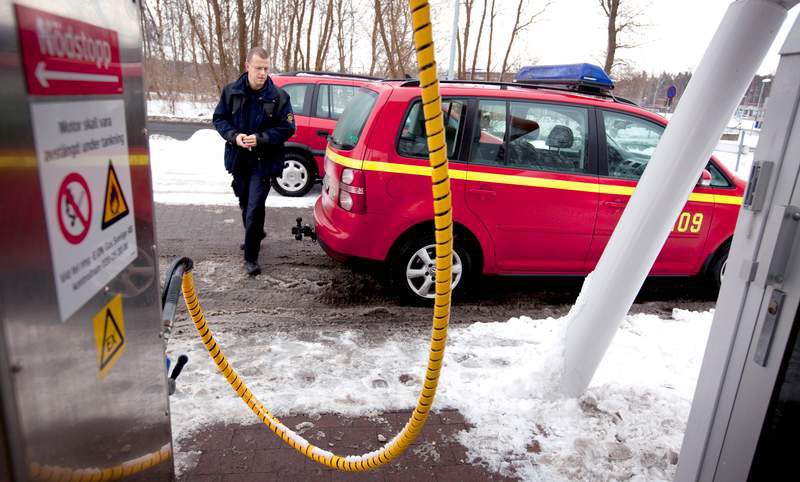Peels and pig innards help Swedish city forgo coal, oil
Published 4:00 am Saturday, December 11, 2010

- A fire inspector fills up a city vehicle with biogas earlier this year in Kristianstad, Sweden. The city's vehicles all run on locally produced biogas (a form of methane made from a variety of waste products) as part of a larger effort to eliminate fossil fuel consumption.
KRISTIANSTAD, Sweden — When this city vowed a decade ago to wean itself from fossil fuels, it was a lofty aspiration.
But Kristianstad has crossed a crucial threshold: The city and surrounding county, with a population of 80,000, essentially use no oil, natural gas or coal to heat homes and businesses. It is a complete reversal from 20 years ago, when all of their heat came from fossil fuels.
The area in southern Sweden has not generally substituted solar panels or wind turbines for the traditional fuels. Instead it generates energy from a motley assortment of ingredients like potato peels, manure, used cooking oil, stale cookies and pig intestines.
A hulking 10-year-old plant on the outskirts of Kristianstad uses a biological process to transform the detritus into biogas, a form of methane. That gas is burned to create heat and electricity, or is refined as a fuel for cars.
Once the city fathers got into the habit of harnessing power locally, they saw fuel everywhere: Kristianstad also burns gas emanating from an old landfill and sewage ponds, as well as wood waste.
“It’s a much more secure energy supply — we didn’t want to buy oil anymore from the Middle East or Norway,” said Lennart Erfors, the engineer who is overseeing the city’s transition. “And it has created jobs in the energy sector.”
The startup costs, covered by the city and through Swedish government grants, have been considerable: The centralized biomass heating system cost $144 million, including constructing a new incineration plant, laying networks of pipes, replacing furnaces and installing generators.
But officials say the payback has been significant: Kristianstad now spends about $3.2 million a year to heat its municipal buildings rather than the $7 million it would spend if it still relied on oil and electricity. It fuels its municipal cars, buses and trucks with biogas fuel, avoiding the need to purchase nearly half a million gallons of diesel or gas each year.
Kristianstad is looking into building satellite biogas plants for outlying areas and expanding its network of underground biogas pipes to allow the construction of more filling stations. But even though biogas fuel costs about 20 percent less than gasoline, consumers are reluctant to spend $32,000 on a biogas or dual-fuel car until they are certain that the network will keep growing.
“A tank is enough to get you around the region for the day, but do you have to plan ahead,” Martin Risberg, a county engineer, said as he filled a biogas Volvo.
Small steps in climate talks
CANCUN, Mexico — Weary delegates from almost 200 nations worked past their deadline and into Friday night to cobble together final decisions wrapping up the U.N. climate conference, small steps to revive the faltering, years-long talks to guard the Earth against planetary warming.
No grand compact mandating deep cuts in global warming gases was in the cards. Instead, the two-week session focused on a proliferation of secondary issues — a “Green Climate Fund” to help poor nations, deforestation, technology sales and other matters.
In the “Copenhagen Accord” that emerged from last year’s climate summit in the Danish capital, richer nations promised $100 billion for such a fund by 2020.
“There is a consensus that we set up a climate fund,” Bangladesh’s state minister for environment, Mohammed Hasan Mahmud, reported Friday. Details of the fund’s oversight were left to post-Cancun negotiations, and the eventual sources of the financing were not identified.
Other issues up for negotiation:
• Setting up a global structure to make it easier for developing nations to obtain patented technology for clean energy and climate adaptation.
• Pinning down more elements of a complex, controversial plan to compensate poorer nations for protecting their climate-friendly forests.
— The Associated Press






